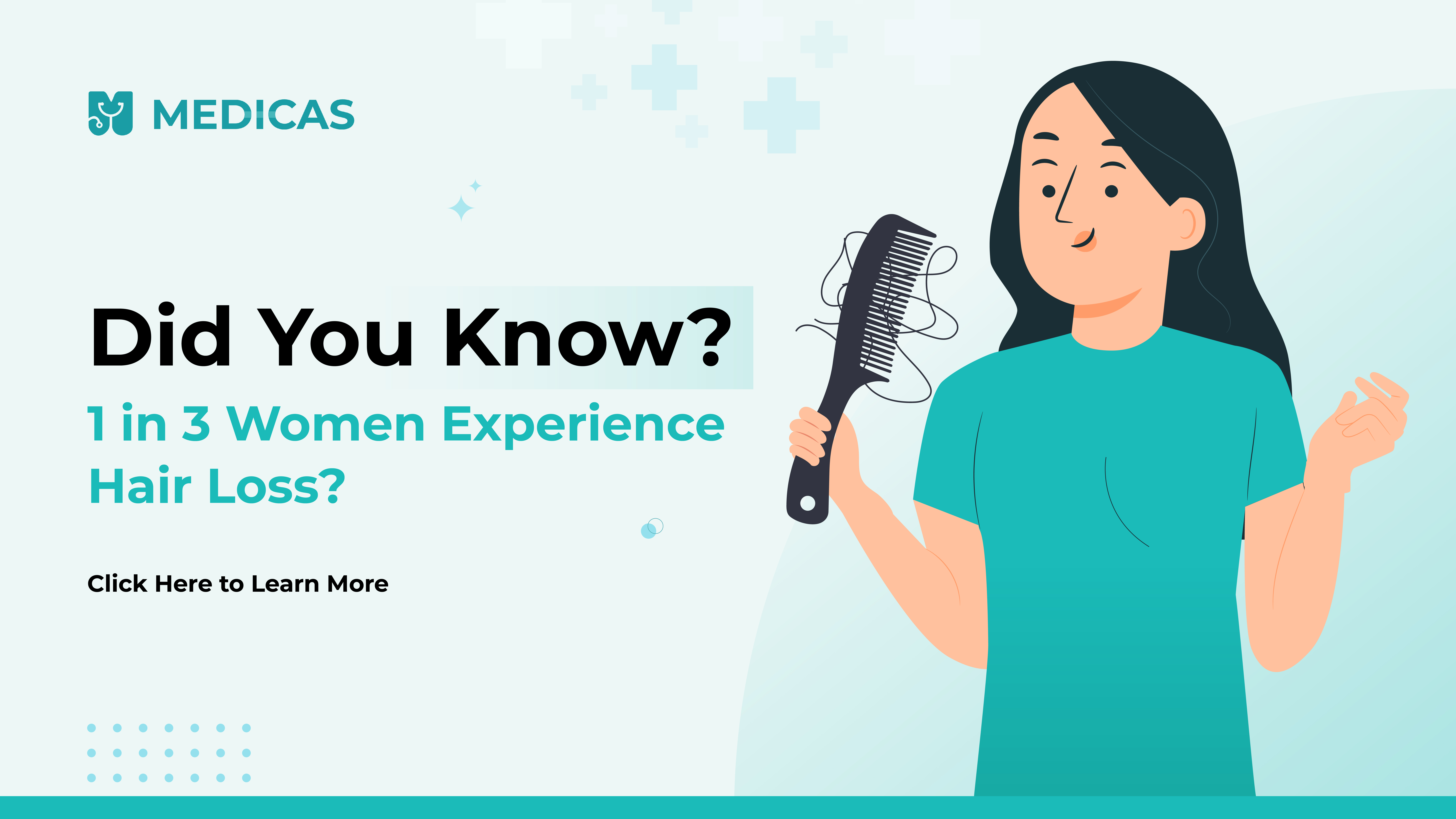Hair loss can be a distressing experience for women, affecting self-esteem and overall well-being. Understanding the symptoms, causes, and prevention methods is crucial for managing and mitigating this common issue. In this blog, we’ll explore the different aspects of hair loss in women and provide valuable tips on how to prevent it.
What are the Symptoms of Hair Loss in Women?
Hair loss in women can manifest in various ways, and recognizing the early signs is essential for timely intervention. Common symptoms include:
- Thinning Hair: One of the most noticeable signs is a gradual thinning of hair, especially on the top of the head.
- Widening Part: Women may observe a wider part in their hair, indicating hair loss.
- Receding Hairline: Although more common in men, some women may also experience a receding hairline.
- Bald Patches: Small bald spots may appear on the scalp.
- Shedding: Excessive shedding of hair, particularly when brushing or washing, may be a sign of hair loss.
- Overall Reduced Volume: Hair may appear less voluminous and more fragile.
What are the Causes of Hair Loss in Women?
Understanding the underlying causes of hair loss is crucial for effective treatment and prevention. Some common causes include:
- Genetic Factors: Hereditary hair loss, also known as androgenetic alopecia, is a significant cause of hair loss in women.
- Hormonal Changes: Hormonal imbalances due to pregnancy, menopause, thyroid issues, or polycystic ovary syndrome (PCOS) may lead to hair loss.
- Stress: Physical or emotional stress may trigger temporary hair loss known as telogen effluvium.
- Nutritional Deficiencies: Inadequate intake of essential nutrients, such as iron, protein, and vitamins, may contribute to hair loss.
- Medical Conditions: Conditions like alopecia areata, lupus, and scalp infections may cause hair loss.
- Medications: Certain medications, including chemotherapy drugs, antidepressants, and blood thinners, may lead to hair loss.
- Hairstyling Practices: Excessive use of heat styling tools, tight hairstyles, and chemical treatments may damage hair and lead to loss.
- Aging: As women age, hair naturally becomes thinner and more prone to falling out.
How to Prevent Hair Loss in Women?
While it may not be possible to prevent all types of hair loss, adopting healthy habits and treatments may help minimize the risk and promote hair health. Here are some effective prevention tips:
- Maintain a Balanced Diet: Ensure you consume a diet rich in essential nutrients, including iron, protein, omega-3 fatty acids, and vitamins (A, C, D, and E).
- Manage Stress: Practice stress-relief techniques such as yoga, meditation, and regular exercise to reduce stress-related hair loss.
- Avoid Harsh Hairstyles: Opt for looser hairstyles and avoid excessive use of heat styling tools and chemical treatments.
- Gentle Hair Care: Use mild shampoos and conditioners, and avoid vigorous brushing or combing when hair is wet.
- Regular Scalp Care: Keep your scalp clean and healthy to prevent infections that may lead to hair loss.
- Medical Consultation: Seek professional advice if you notice significant hair loss. A dermatologist or trichologist can diagnose the underlying cause and recommend appropriate treatments.
- Hormonal Balance: Monitor and manage hormonal imbalances by consulting with a healthcare provider.
- Proper Medication Use: If medications are causing hair loss, discuss alternative options with your doctor.
Conclusion
Hair loss in women is a multifaceted issue that can be caused by various factors. Recognizing the symptoms and understanding the underlying causes are crucial steps in managing hair loss effectively. By adopting healthy habits, seeking professional advice, and using appropriate treatments, women can significantly reduce the risk of hair loss and promote healthier, stronger hair. With the availability of 24/7 online doctor consultations in India, getting expert help has become more accessible than ever. Early intervention is key to preventing and managing hair loss, so don’t hesitate to seek help if you notice any signs of excessive hair shedding or thinning.
Other Healthcare Blogs:
Can Malnutrition Cause Hair Loss?
Say Goodbye to Hairfall: 10 Effective Solutions
Navigating Women’s Health Concerns: How Online Consultation Can Help
Maximize Your Weight Gain Progress with Oats: The Tasty Solution
8 Ways of How to Lead a Healthy Lifestyle on a Tight Budget
Disclaimer:
Medical Advice: The information provided in this blog post is for educational purposes only and should not be considered as a substitute for professional medical advice, diagnosis, or treatment. Always consult with a qualified healthcare professional for personalized guidance regarding your specific medical condition.
Accuracy of Information: While we strive to provide accurate and up-to-date information, the field of medicine and viral fevers is constantly evolving. The content in this blog post may not reflect the most current research or medical guidelines. Therefore, it is advisable to cross-check any information provided with reliable sources or consult a healthcare professional.
Individual Variations: The symptoms, causes, treatment options, and preventive measures discussed in this blog post are general in nature and may not apply to everyone. It is important to remember that each individual’s situation is unique, and personalized medical advice should be sought when making healthcare decisions.
External Links: This blog post may contain links to external websites or resources for additional information. However, we do not endorse or have control over the content of these third-party websites. Accessing these links is done at your own risk, and we are not responsible for any consequences or damages that may arise from visiting these external sources.
Results May Vary: The effectiveness of treatment options or preventive measures mentioned in this blog post may vary from person to person. What works for one individual may not work the same way for another. It is essential to consult with a healthcare professional for personalized advice tailored to your specific needs.

Dr. Murali serves as the Chief Medical Officer at EGS Health, bringing over 18 years of experience as a general practitioner to his role. He also directs Special Projects & Development at the Central America Health Sciences University, Belize Medical College. Dr. Murali holds an MD and a PG Cert in Health Profession Education (HPE) and has been an active contributor to the medical field since 2001. His career began in the Tobacco Cessation Program and the Border Family Welfare Programs in conjunction with PAHO in Ciudad Juarez, where he also published research on the impact of technology on healthcare education. He later became a clinical coordinator for clerkships, forging partnerships between students and hospitals that now serve as clinical sites for the university. Dr. Murali has furthered his expertise through advanced training, including the Leaders in Healthcare Education course at Harvard Macy Institute and the Health Professions Certification Program at Keele University, enhancing his influence in both medical education and healthcare delivery, both locally and internationally.


